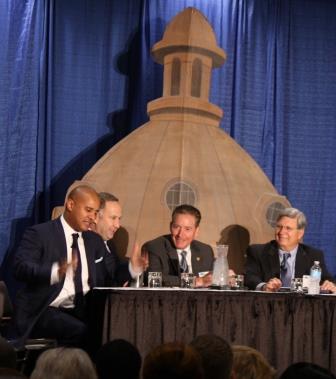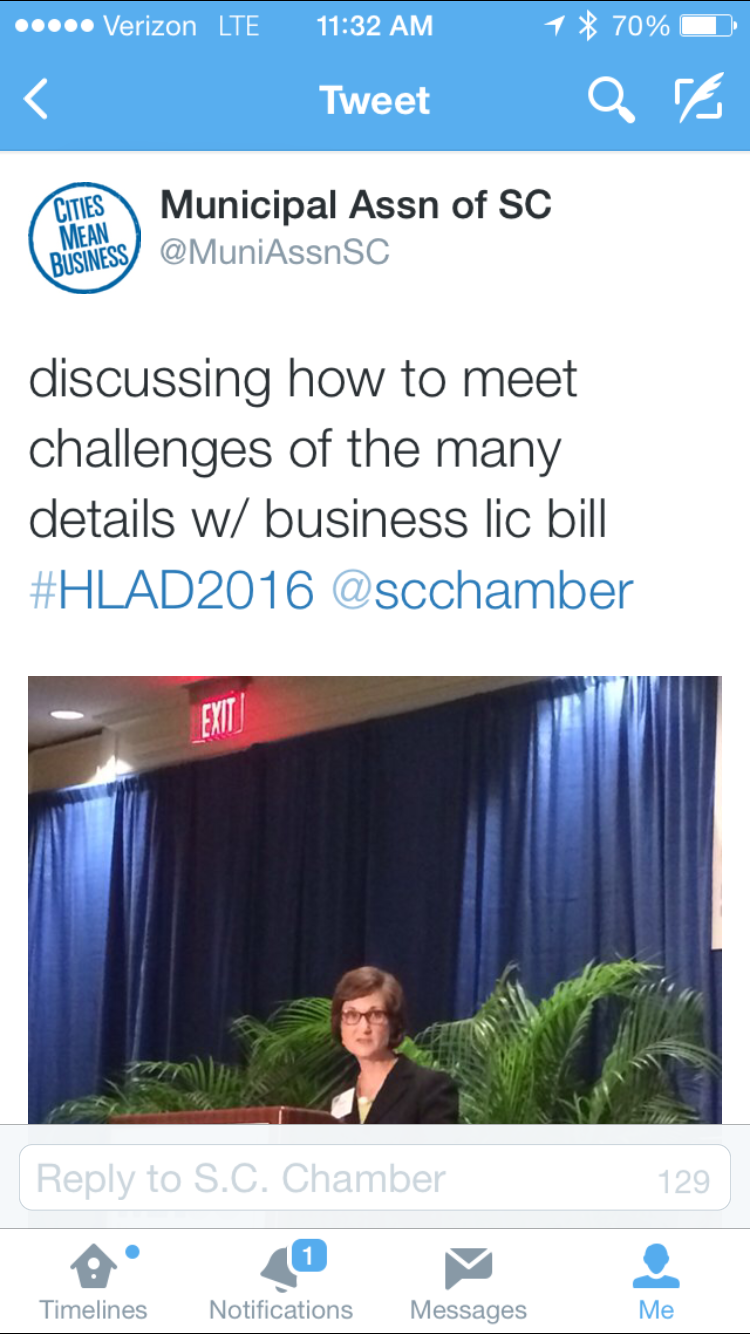Collaboration was a theme that echoed among legislators and business leaders who spoke to local officials at Hometown Legislative Action Day in February. They touched on topics ranging from roads to education and open government to funding services.

Legislative panel: (L-R) Rep. Todd Rutherford, Sen. Joel Lourie, Sen. Greg Hembree
and Rock Hill Mayor Doug Echols. Panelists not pictured: Rep. Jenny Horne
and Rep. Laurie Funderburk.
Rock Hill Mayor Doug Echols moderated a panel of House members and Senators who told the assembled local officials it’s important they have the tools they need to provide the services residents and businesses demand.
Representative Todd Rutherford (D-Richland) observed, "Services have to be paid for somehow. Money isn’t just going to materialize."
The legislators had diverse opinions on tax policy and how to raise the money to fund maintenance for the state’s crumbling infrastructure. Senator Greg Hembree (R-Horry) said he supports raising the gas tax and reducing the income tax, noting South Carolina has the third lowest gas tax in the country.
Senator Joel Lourie (D-Richland) said he didn’t believe the income tax reduction was necessary. "Nobody comes up and talks to me about their tax bracket," said Lourie "They talk to me about their potholes. I can’t support funding tax relief while we are not funding needs already there."
When asked by Echols about attention to secondary and rural roads in the roads bill, Hembree observed that part of the reason interstates and major roads have gotten more attention than secondary and rural roads is the fact that so much of the money the SC Department of Transportation receives is federal money.
"As state dollars have shrunk," he said, "DOT has turned to the federal government. That means major roads and interstates get most of the attention while the smaller projects get put aside."
Representative Jenny Horne (R-Charleston, Dorchester) added that she believed money for both roads and education must be in a trust fund to ensure they are used for their intended purpose.
All of the legislators echoed support for full funding of the Local Government Fund.
Representative Laurie Funderburk (R-Kershaw) said the big issue with LGF funding is ensuring predictability. "It’s hard for you to budget if you don’t know from year to year how much you will be getting." She said it makes good sense for the formula for the LGF to correspond to state growth as outlined in H3374.
Following the legislative discussion, Cayce Mayor Elise Partin facilitated a panel consisting of executives from three associations the Municipal Association partners with frequently on legislative issues. All three executives are veterans of working with the legislature, and all echoed the theme of collaboration when working to get legislation passed.
When asked to talk about the partnership between the South Carolina Chamber of Commerce and Municipal Association in working on business licensing legislation, Ted Pitts, president and CEO of the Chamber, said, "It’s important to first look at what we can agree on—what will be good for business and good for local government. I’m very encouraged with where we are on this business licensing issue right now."

Presentation by Municipal Association Executive Director
Miriam Hair generated lots of Twitter conversations.
Bill Rogers, executive director of the SC Press Association, pointed out several examples of how good laws are made through collaboration and compromise. That approach was the reason the legislature passed a bill last session to change how meeting agendas of public bodies can be amended, he said. "Our two associations don’t disagree on much," he said, noting open government is the goal of both the Press Association and the Municipal Association.
Bill Ross, executive director of SC Alliance to Fix our Roads, said his organization is focused on one thing…funding for the state’s infrastructure. SCFOR’s approach is to bring together more than 90 organizations, including the Municipal Association, with an interest in infrastructure funding.
Ross noted, "With an issue like this, the approach to lobbying is very much grassroots."
Social media, he pointed out, is becoming the true grassroots strategy for lobbying. "Social media gives us a way to keep the pressure on from the ground up every day."
